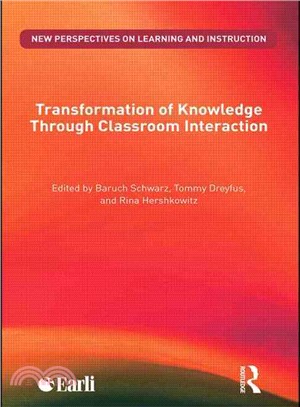Transformation of Knowledge Through Classroom Interaction
商品資訊
ISBN13:9780415492256
出版社:Routledge UK
作者:Baruch Schwarz (EDT); Tommy Dreyfus (EDT); Rina Hershkowitz (EDT)
出版日:2009/04/09
裝訂/頁數:平裝/328頁
商品簡介
作者簡介
目次
商品簡介
Classrooms provide extremely varied settings in which learning may take place, including teacher-led conversations, small group unguided discussions, individual problem solving or computer supported collaborative learning (CSCL).
Transformation of Knowledge through Classroom Interaction examines and evaluates different ways which have been used to support students learning in classrooms, using mathematics and science as a model to examine how different types of interactions contribute to students’ participation in classroom activity, and their understanding of concepts and their practical applications. The contributions in this book offer rich descriptions and ways of understanding how learning occurs in both traditional and non-traditional settings. Combining theoretical perspectives with practical applications, the book includes discussions of:
the roles of dialogue and argumentation in constructing knowledge
the role of guidance in constructing knowledge
abstracting processes in mathematics and science classrooms
the effect of environment, media and technology on learning processes
methodologies for tracing transformation of knowledge in classroom interaction.
Bringing together a broad range of contributions from leading international researchers, this book makes an important contribution to the field of classroom learning, and will appeal to all those engaged in academic research in education.
Transformation of Knowledge through Classroom Interaction examines and evaluates different ways which have been used to support students learning in classrooms, using mathematics and science as a model to examine how different types of interactions contribute to students’ participation in classroom activity, and their understanding of concepts and their practical applications. The contributions in this book offer rich descriptions and ways of understanding how learning occurs in both traditional and non-traditional settings. Combining theoretical perspectives with practical applications, the book includes discussions of:
the roles of dialogue and argumentation in constructing knowledge
the role of guidance in constructing knowledge
abstracting processes in mathematics and science classrooms
the effect of environment, media and technology on learning processes
methodologies for tracing transformation of knowledge in classroom interaction.
Bringing together a broad range of contributions from leading international researchers, this book makes an important contribution to the field of classroom learning, and will appeal to all those engaged in academic research in education.
作者簡介
Baruch Schwarz is Associate Professor of Education, School of Education, The Hebrew University of Jerusalem, Israel.
Tommy Dreyfus is Professor of Science Education, Tel Aviv University, Israel.
Rina Hershkowitz is Head Researcher, Department of Science Teaching, Weizmann Institute of Science, Israel.
Tommy Dreyfus is Professor of Science Education, Tel Aviv University, Israel.
Rina Hershkowitz is Head Researcher, Department of Science Teaching, Weizmann Institute of Science, Israel.
目次
Introduction Part 1: Construction of knowledge in classroom interactions 1.1 The nested epistemic actions model of abstraction in context Baruch Schwarz, Hebrew University of Jerusalem, Israel, Tommy Dreyfus, Tel Aviv University, Israel and Rina Hershkowitz, Weizmann Institute of Science, Rehovot, Israel 1.2 Construction of physics knowledge in the classroom from different perspectives: the classroom as a community and the students as individuals, Andrée Tiberghien, CNRS Université de Lyon, France and Layal Malkoun 1.3 Technology based algebra learning: epistemological discontinuities and curricular implications Michal Yerushalmy, University of Haifa, Israel 1.4 Toward trialogical approach to learning, Kai Hakkarainen, University of Joensuu, Finland and Sami Paavola, University of Helsinki, Finland 1.5 Commentary on the chapters on the construction of knowledge, Ivy Kidron, Jerusalem College of Technology and John Monaghan, University of Leeds, UK Part 2: The role of the teacher in the transformation of knowledge in classroom interactions 2.1 Expert Support for Group Work in Elementary Science: The Role of Consensus, Christine Howe, University of Cambridge, UK 2.2 Guidance in Construction of Knowledge in the Classroom: the troika of talk, tasks and tools, Sarah Michaels, Clark University, USA, M.C. O’Connor, Boston University, USA, Richard Sohmer, The Investigators Club, USA and Lauren Resnick, University of Pittsburgh, USA 2.3 Implementing technology-facilitated collaboration and awareness in the classroom - roles for teachers, educational researchers and technology experts, Ulrich Hoppe, University of Duisburg-Essen, Germany, Reuma De-Groot, Hebrew University of Jerusalem, Israel and Rakheli Hever, The Hebrew Univesity Jerusalem Part 3: The role of argumentation and dialogue in the transformation of knowledge 3.1 Intersubjective and intrasubjective rationalities in pedagogical debates: realising what one thinks, Michael Baker, CNRS & Université Paris X, France 3.2 Transformation of robust misconceptions through peer argumentation Christa S. C. Asterhan and Baruch B. Schwarz, The Hebrew University of Jerusalem, Israel 3.3 Commentary on the chapters by Baker, and Asterhan and Schwarz through the lenses of commognition, Anna Sfard, University of Haifa, Israel 3.4 A dialogue on dialogue and its place within education, Rupert Wegerif, Exeter University, UK, Jerry Andriessen, University of Utrecht, Paolo Boero, University of Genova, Italy and Ellice Forman, Universty of Pittsburgh, USA Part 4: Methodologies for studying transformation of knowledge in classroom interaction 4.1 A methodological framework and empirisal techniques for studying the travel of ideas in classroom communities, Geoffrey B. Saxe, Meghan Shaughnessy, Darrell Earnest, Sarah Cremer, Linda Platas and Adena Young, University of California, Berkeley, USA 4.2 A Design Research Perspective on the Identities that Students are Developing in Mathematics Classrooms, Paul Cobb, Vanderbilt University, Nashville, TN, USA, Melissa Gresalfi, University of Indiana, USA and Lynn Liao Hodge, University of Tennessee, USA 4.3 Methodological Considerations in the Study of Intersubjectivity Among Participants of a Dialogic Mathematics Classroom , Mitchell J. Nathan, University of Wisconsin-Madison, USA, Billie Eilam, University of Haifa, Israel and Suyeon Kim, University of Wisconsin-Madison, USA 4.4 Comparing and contrasting methodologies: a commentary, Angelika Bikner-Ahsbahs, University of Bremen, Germany and Gaye Williams, Deakin University, Australia Part 5: General reflections on transformations of knowledge in classroom interactions 5.1 Contour lines between a model as a theoretical framework and the same model as methodological tool, Rina Hershkowitz, Wiezmann Institute of Science, Rehovot, Israel 5.2 Learning in schools: a dialectical materialistic, cultural-historical activity theoretic perspective, Wolff-Michael Roth, University of Victoria 5.3 Sociogenesis and cognition: the struggle between social and cognitive activities, Sten Ludvigsen, University of Oslo.
主題書展
更多
主題書展
更多書展購物須知
外文書商品之書封,為出版社提供之樣本。實際出貨商品,以出版社所提供之現有版本為主。部份書籍,因出版社供應狀況特殊,匯率將依實際狀況做調整。
無庫存之商品,在您完成訂單程序之後,將以空運的方式為你下單調貨。為了縮短等待的時間,建議您將外文書與其他商品分開下單,以獲得最快的取貨速度,平均調貨時間為1~2個月。
為了保護您的權益,「三民網路書店」提供會員七日商品鑑賞期(收到商品為起始日)。
若要辦理退貨,請在商品鑑賞期內寄回,且商品必須是全新狀態與完整包裝(商品、附件、發票、隨貨贈品等)否則恕不接受退貨。













